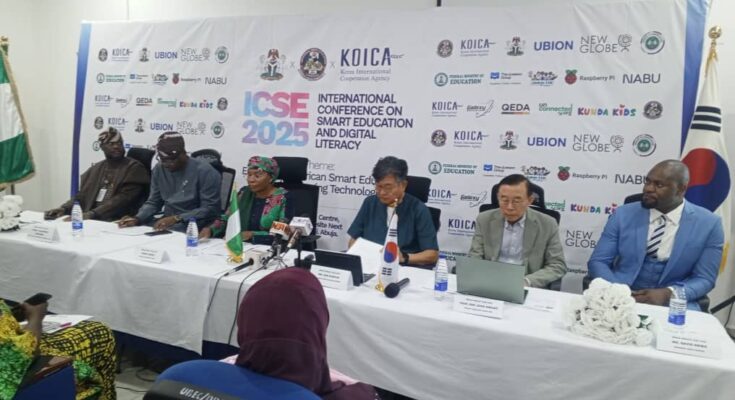The Executive Secretary of the Universal Basic Education Commission (UBEC), Aisha Garba, has said UBEC is trying to shift from the hardware-invested infrastructure to make Nigeria’s basic education schools to be smart, technology-enabled and to deploy technology in providing access to basic education across all parts of Nigeria.
At a press conference on Monday, ahead of the International Conference on Smart Education and Digital Literacy, with the theme: Empowering African Smart Education Through Emerging Technologies, Mrs Garba said UBEC’s data shows that less than 50 per cent of public primary schools in Nigeria have digital technology in their schools.
She said: “This is for us an opportunity to share lessons with international partners, but also many other neighbouring countries. The key objective of this international conference is on the strategic vision of the whole Renewed Hope Agenda, which is to move the Nigerian economy from the resource-based to a knowledge-based economy. For us, this is key. This opportunity will give us a way to be an international competitive country with other countries that we see.
“For example, Rwanda has been using technology in basic education system for many years. They have reached a level of using AI in their classrooms. For us in Nigeria, we have already started by doing the smart schools, which many of you are aware of. We have about 36 plus one smart schools, one in each of all the states that we have in the country. And these smart schools are very high technology advanced with studio, content studio, teachers that are already skilled in terms of technology, teaching and learning in the classroom.
“But in addition to that, from the data, it shows that less than 50% of public primary schools in Nigeria have digital technology in their schools. So for that, in UBEC, it’s very important what we’re doing, which is trying to shift from the hardware-invested infrastructure to make our basic education schools to be smart, technology-enabled, to deploy technology in providing access to basic education across all parts of Nigeria.
“Whether a child is in the rural area, semi-urban or urban area, there’s a technology appropriate to be applied to that context that will enable the child to read and write. In addition to what the child can get, for us, very key activity is the teacher. Whether a teacher is ICT skilled or not, part of what we’re doing is to ensure the training of teachers to be able to offer them a platform that they can be trained in terms of how they can teach smart education across parts of Nigeria.
“In some of the schools, we have already started doing that, through what we call the Effective Schools, where we have the minimum of computer lab, minimum of ICT skills, smart boards and also already qualified teachers. They use scripted lesson in a tablet to teach in the classroom. So for us, these are some of the activities that we are already doing at UBEC to shift the whole basic education system into a smart enable basic education in Nigeria.
“Through this particular conference, we will hear a lot of what other countries are doing and also the lessons they’ve learned also from our experts that will be there to participate and share their own lessons and we hope to summarize all these lessons and apply it to what we are already doing so we can do it at scale, working together with state governments, the SUBEBs at the state level. What we aim to do is to do the technology-enabled teaching in all parts of Nigeria.”
Also speaking, the Country Director of KOICA, Mr Kim Eunsub, said the country will continue supporting the Nigerian government in improving student learning outcomes, especially in mathematics and science subjects.
“We conducted a serious assessment and comparison, looking closely at the six KOICA supported smart schools, at the same time comparing them with other public schools in the participating states. We found that students in smart schools consistently outperformed their peers in both maths and science, so that’s a powerful result. I think it shows that the project isn’t just working, it’s making a big difference in both the quality of teaching and the effectiveness of learning. So, I hope that these outcomes and these impacts can be replicated in the schools across the country,” he said.
On his part, Deputy Executive Secretary (Technical) of UBEC, Rasaq Olajuwon Akinyemi, said the conference will strengthen the basic education ecosystem through strategic partnerships, policy alignment, and sustainable financing models for digital infrastructures and content for all.
“This conference aims to expand equitable access to quality basic education through inclusive technology-driven initiatives, especially for underserved communities, enhance teaching and learning quality by promoting digital pedagogy, innovative curriculum design and 21st-century skills development.
“It aims to optimize institutional systems using data-driven planning, monitoring, and smart school management tools for improved education delivery, promote research, innovation, and stakeholder engagement to scale best practices and ensure sustainability of digital transformation efforts.
“It will strengthen the basic education ecosystem through strategic partnerships, policy alignment, and sustainable financing models for digital infrastructures and content for all. Together, we’ll explore innovative solutions for education and collaborate to drive progress and shape Africa’s educational future,” he said.

